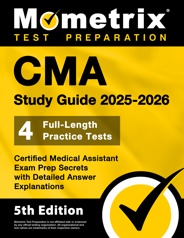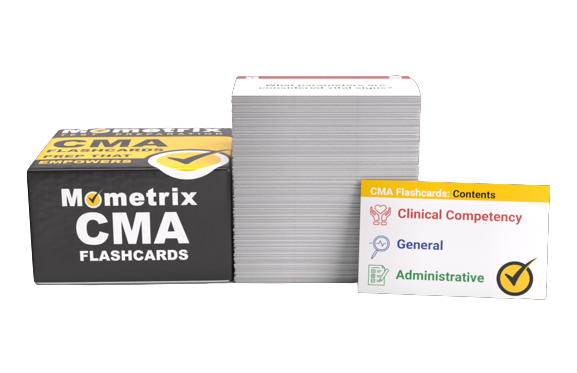The Certified Medical Assistant (CMA) exam, provided by the American Association of Medical Assistants (AAMA), allows candidates to become certified as a medical assistant in the United States. This is an occupation that is expected to have an employment rate increase of 29% by 2026.
Click “Start Test” above to take a free CMA practice test!
Exam Eligibility
To be eligible to sit for the CMA exam, you must be in one of the following three categories:
Category 2: You must be a non-recent (greater than 12 months since graduation) graduate of an accredited medical assisting program. To be eligible under this category, you must submit an official transcript from an accredited medical assisting program.
Category 3: This category is for those wishing to recertify their CMA credential. As you would expect, you must have taken and passed the CMA previously to be eligible under this category, so you must provide your CMA (AAMA) certificate number and the most recent certification or recertification date on the application.

Medical Assistant Test Outline
The CMA exam consists of 200 multiple-choice questions, 20 of which will not count toward your score. The exam is administered in four 40-minute segments, with optional breaks between each segment.
The questions are split into three content categories:
I. Clinical Competency (106 questions)
The Clinical Competency category is the largest on the exam, taking up 59% of the questions. These are the topics that will be covered in this category:
A. Clinical Workflow
- Vital Signs
- Medical Terminology
- Interviewing Techniques
- Documentation of Care
- Patient Screenings and Wellness Assessments
- Processing Provider Orders
B. Safety and Infection Control
- Infectious Agents
- Infection Cycle
- Modes of Infectious Transmission
- Standard Precautions and Exposure Control
- Medical Asepsis
- Biohazard Disposal and Regulated Waste
- Safety Resources
- Safety and Emergency Procedures
- Emergency Management, Identification, and Response
- Basic First Aid
- Body Mechanics/Ergonomics
- Risk Management and Quality Assurance
C. Procedures and Examinations
- Preparing Patients for Examinations, Procedures, and Treatments
- Supplies, Equipment, Techniques, and Patient Instruction
- Surgical Assisting
- Wound Care
- Instruments
- Anatomy and Physiology
- Specimen Collection Techniques
- Prepare, Process, and Examine Specimens
- Laboratory Quality Control and Quality Assurance
- Clinical Laboratory Improvement Act (CLIA) Requirements
- Laboratory Panels and Selected Tests
D. Pharmacology
- Medications
- Preparing and Administering Oral and Parenteral Medications
- Immunization Resources
II. General (38 questions)
The General category contains 38 questions, taking up 21% of the questions. These are the topics that will be covered in this category:
E. Legal and Ethical Issues
- HIPAA
- Protected Health Information (PHI)
- Consent
- Federal and State Regulations
- Pharmaceutical Laws
- Mandatory Reporting and Public Health Statutes
- Ethical Standards
- Medical Directives
F. Communication
- Interpersonal Relationship Skills
- Customer Service
- Therapeutic and Adaptive Responses
- Learning Styles
- Health Care Team Roles
- Professional Telephone Etiquette and Techniques
III. Administrative (36 questions)
The Administrative category contains 36 questions, taking up 20% of the questions. These are the topics that will be covered in this category:
G. Billing, Coding, and Insurance
- Coding Applications
- Insurance Fraud and/or Abuse
- Coverage for Patient Services and Waivers
- Insurance Types
- Authorizations and Resources
- Financial Terminology
- Patient Account Financial Procedures
- Financial Calculations
- Billing and Collections
H. Scheduling Appointments and Health Information Management
- Scheduling Appointments
- Medical Reception
- Patient Registration
- Electronic Health Records
Check Out Mometrix's CMA Study Guide
Get practice questions, video tutorials, and detailed study lessons
Get Your Study Guide
Registration
Before you can register for the exam, you must obtain an exam scheduling permit. To obtain your permit, you must submit the required documentation and candidate fee. The fee is payable by money order, credit or debit card, cashier’s/certified check or institution check only.
Five to 10 days after your application, you will receive an email. If you were successful in submitting all required documentation and the candidate fee, your 90-day testing period will be assigned and the availability of your exam Scheduling Permit will be included. Failure to respond to an “incomplete” status could void your application which would require you to reapply and pay the candidate fee again.
You must schedule your exam directly through their online registration site or by calling the number listed on your scheduling permit. Test dates, times, and locations are on a first-come-first-served basis, so make an effort to schedule your exam as soon as possible so you can obtain your preferred test time and location.
Fees
The exam fees are as follows:
- Category 1: $125
- Category 2: $125 for AAMA members and $250 for nonmembers
- Category 3: $125 for AAMA members and $250 for nonmembers
Test Day
You should arrive at the test center at least 30 minutes before your scheduled test time. If you arrive late, you may not be admitted. You will be asked to present the required identification, sign the test center log, have your photograph taken, and store all personal items in an assigned locker (it is recommended that you leave all personal items in your car or at home as the lockers are small).
Test center staff will take your scheduling permit and escort you to your assigned station. You will be instructed on the use of the computer equipment and provided dry-erase markers and an eraser. You are allowed no other supplies. A dry-erase marker and eraser are the only supplies you will be given.
Once you enter the testing center and take your seat, you will not be allowed to talk to any other test-taker, and you will be allowed breaks only at the designated break time. Failure to follow the test center rules could result in the cancellation of your test and your candidate fee forfeited.
How the CMA Exam is Scored
Your score is a result of the number of correct responses on the examination, and will fall in a range of 200-800. The minimum score you need to pass the CMA exam is 405.
At the conclusion of your exam, you will receive an official pass/fail notification. While an official notification, this is not a verification of certification. If you completed all application requirements, you will be mailed an official examination score result within three weeks after your exam.
The exam report will include your percentile rank in the three content areas to help you identify your areas of strength and weakness. If you pass the exam and receive the official notification, you are awarded the CMA (AAMA) credential.
Check Out Mometrix's CMA Flashcards
Get complex subjects broken down into easily understandable concepts
Get Your Flashcards
How to Pass
How to Study Effectively
Your success on CMA test day depends not only on how many hours you put into preparing but also on whether you prepared the right way. It’s good to check along the way to see whether your studying is paying off. One of the most effective ways to do this is by taking CMA practice tests to evaluate your progress. Practice tests are useful because they show exactly where you need to improve. Every time you take a free CMA exam practice test, pay special attention to these three groups of questions:
- The questions you got wrong
- The ones you had to guess on, even if you guessed right
- The ones you found difficult or slow to work through
This will show you exactly what your weak areas are and where you need to devote more study time. Ask yourself why each of these questions gave you trouble. Was it because you didn’t understand the material? Was it because you didn’t remember the vocabulary? Do you need more repetitions on this type of question to build speed and confidence? Dig into those questions and figure out how you can strengthen your weak areas as you go back to review the material.
Answer Explanations
Additionally, many CMA practice tests have a section explaining the answer choices. It can be tempting to read the explanation and think that you now have a good understanding of the concept. However, an explanation likely only covers part of the question’s broader context. Even if the explanation makes sense, go back and investigate every concept related to the question until you’re positive you have a thorough understanding.
Comprehend Each Topic
As you go along, keep in mind that the CMA practice test is just that: practice. Memorizing these questions and answers will not be very helpful on the actual test because it is unlikely to have any of the same exact questions. If you only know the right answers to the sample questions, you won’t be prepared for the real thing. Study the concepts until you understand them fully, and then you’ll be able to answer any question that shows up on the test.
Strategy for CMA Practice
When you’re ready to start taking practice tests, follow this strategy:
- Remove Limitations. Take the first test with no time constraints and with your notes and CMA study guide handy. Take your time and focus on applying the strategies you’ve learned.
- Time Yourself. Take the second practice test “open book” as well, but set a timer and practice pacing yourself to finish in time.
- Simulate Test Day. Take any other practice tests as if it were test day. Set a timer and put away your study materials. Sit at a table or desk in a quiet room, imagine yourself at the testing center, and answer questions as quickly and accurately as possible.
- Keep Practicing. Keep taking practice tests on a regular basis until you run out of practice tests or it’s time for the actual test. Your mind will be ready for the schedule and stress of test day, and you’ll be able to focus on recalling the material you’ve learned.
Certified Medical Assistant Online Prep Course
If you want to be fully prepared, Mometrix offers an online CMA prep course designed to give you everything you need to succeed!
Here’s what you’ll find in the CMA course:
- 70+ Review Lessons Covering Every Topic
- Over 1,400 CMA Practice Questions
- 30+ Video Tutorials
- 350+ Digital Flashcards
- Money-back Guarantee
- Mobile Access
Everyone learns differently, so we’ve tailored the CMA online prep course to ensure every learner has what they need to prepare for the Certified Medical Assistant exam.
Click below to check it out!
FAQs
Q
How hard is the CMA exam?
A
The CMA exam has a pass rate of 73%, so it is considered a moderate-to-easy exam if an adequate amount of studying and preparation has been done.
Q
How many questions are on the CMA exam?
A
There are 200 questions on the exam.
Q
How long is the CMA exam?
A
The time limit for the exam is 160 minutes, which is just over 2.5 hours.
Q
How much is the CMA exam?
A
The CMA exam costs $125.00 for AAMA members and $250 for non-members.
Q
What is a passing score for the CMA exam?
A
To pass the exam, you will need a minimum score of 405.



